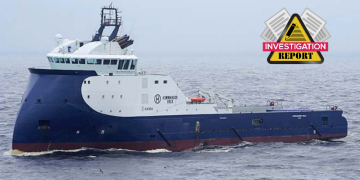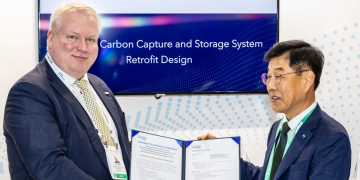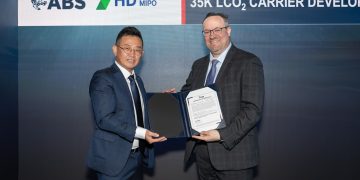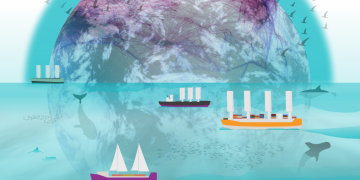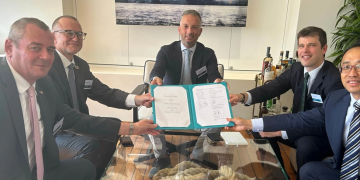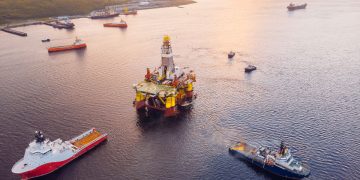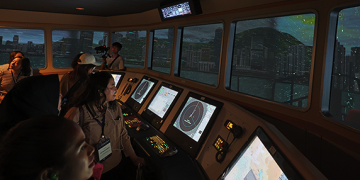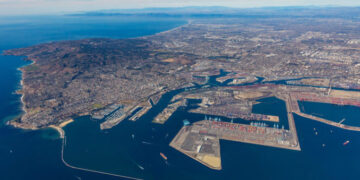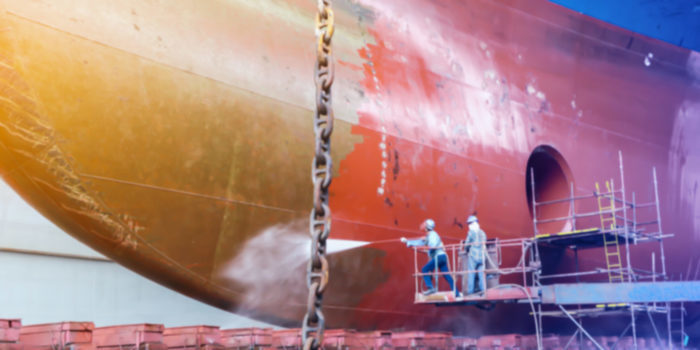During the 2019 GREEN4SEA Conference, Mr. Tom H. Evensen, Sales Director for Jotun’s Hull Performance Solutions and Mr. Manolis Levantis, Analyst Manager, focused on hull performance for ships. Mr. Evensen and Mr. Levantis highlighted the major impact that such a feature has on a vessel’s efficiency. They also noted that in order to achieve the ideal hull efficiency, proper surface preparations are vital.
One of the reoccurring challenges the industry faces, is the relentless focus on efficiency, cost and environmental issues.
It goes without saying that all of these are somehow interlinked and hull propeller performance stands out as one of the lower hanging fruits, as seen from our point of view.
The accumulation of fouling is a vessels’ operators’ true nightmare. It’s a true killer for operational efficiency and could lead to potentially substantial overconsumption of fuel and even low levels of accumulation of slime can have a significant impact on the vessels efficiency.
Examining a purchasing behavior of a major share of the global merchant fleet between 2012 and 2018, where the data sample is an accumulative result of more than 40.000 dry dockings equal to 1.5 billion deadweight tons. The research was across all vessel types and across all major marine coating suppliers. We noticed that from 2012 to 2014, we experienced a shift in purchasing behavior with a larger number of customers having increased focus on what we categorize as ‘’well performing products’’. But since 2014 very little has changed in terms of purchasing behavior.
Representatives of the shipping industry, are virtually bombarded with all sorts of performance-enhancing measures and technologies and in Jotun, we focus on the hull performance part, which represents a larger improvement potential than most would think.
Numerous studies and reports have disclosed the vast importance of good hull and propeller performance. So, why is it that this very important area is given such little focus? After discussing with our close customers and partners, we believe that one of the root causes is that coatings are categorized as consumables and not regarded as permanent investments.
Now, whatever so-called performance enhancing offer comes at your desk, you need to ask yourself three questions:
- What is the investment being asked for;
- What is the return of investment;
- How is the potential saving measured and documented.
To achieve maximum hull efficiency, as seen from a paint makers perspective, it all starts with proper surface preparations.
Having worked through a great number of reference cases we can draw the following conclusions:
- Pre-treatment effects are vessel specific and rely on the pre-docking performance level;
- For touch ups we have disclosed a speed gain in the range of 3 – 7% (equals 9 – 21% fuel saving);
- For full blasts we have disclosed a speed gain in the range of 5 – 17% (equals 15 – 41% fuel saving).
The next step would be to invest in a proper performing and documented coating system. Most antifouling systems perform well for 2 to 3 years. Then, they experience a quite steep drop in performance.
By investing in high-end antifouling coating systems you would be able to raise the performance by a significant level and thereby experience a much more stable performance, in contrast with what we see with market average performing technologies.
Following this would be to achieve the highest possible level of application excellence, regardless of cheap or expensive technology, it still is a semi-finished product, wet paint in a bucket, which has to be applied in a proper way under challenging conditions. Moving from good applications, to a worst-case application can have a significant impact on the overall performance of a vessel.
The next step is moving into as optimized specifications as possible. Jotun has for quite some time been using high resolution AIS data to analyze the historic trade of vessels, and expectations for future trades in order to calculate the effective operational parameters.
As analysts, we believe that a more analytical approach should be followed, the moment the vessel leaves the dock.
The starting point: Performance monitoring. It’s no secret that we have been strong supporters of the ISO 19030 methodology. It may have its limitations, but it nevertheless represents a very good methodology in order to measure hull and propeller performance. Most importantly, all relevant stakeholders can agree that it is a transparent methodology.
The 4 Performance indicators for the ISO 19030 are:
- Drydocking performance is a KPI where we can measure initial coating performance and the effect of surface preparation and application excellence.
- Inservice performance is a KPI where we can measure the hull and propeller performance over the vessels drydock cycle, 3 or 5 years, including any maintenance that has taken place.
- Maintenance trigger is a very interesting KPI, from an operator’s point of view, because we can check when is the right time to do a maintenance. This maintenance can be propeller cleaning, hull cleaning or even a drydock.
- Maintenance effect is the KPI to measure the effect of the above maintenance.
We use this data in order to do a statistical analysis on the oceanographic parameters and identify the conditions the vessel has been exposed to over time. Also, we have access to sea surface temperature, concentration of chlorophyll, and other oceanographic parameters which can help us do our statistical analysis. The outcomes of the analysis, will help identify low risk idling positions. The most challenging condition for a vessel’s hull, is when the vessel is idling. So, we can use current data, historical data and identify where would be the right place to position the vessel in order to stay for an extended period of time. We can also use this data to create probabilistic models. These models can give us outcomes to rate vessels or trade based on fouling pressure.
All this data can be used for proactive in-service maintenance regime. Nowadays, we see that inspection and maintenance schemes are not rigid enough to avoid hull deterioration. Some operators start doing inspections after the third or fourth year, whereas other operators do by default three or four times per year. Consequently, by having well-timed and analytical driven inspections and maintenance, we can improve efficiency substantially. We can have more optimized specifications and by that reduce the cost.
To summarize, in order for operators to maximize hull efficiency, investment in premium coatings is the starting point. This will help us raise the overall performance to a high level. Operators should focus on proper surface preparation and application of excellence. Then, in order to do proper performance monitoring based on the ISO 19030 methodology, we need access to write data so as to have the correct specifications and statistical analysis on oceanographic parameters, to identify less risky areas to idle, for trade or vessels and finally, a proactive in-service maintenance regime.
Above text is an edited version of Mr. Tom Evensen & Mr. Manolis Levantis’s presentation during the 2019 GREEN4SEA Conference.
You may view their presentation herebelow
The views presented hereabove are only those of the author and not necessarily those of SAFETY4SEA and are for information sharing and discussion purposes only.
 Tom H. Evensen, Sales Director HPS (Hull Performance Solutions), Jotun – Performance Coatings
Tom H. Evensen, Sales Director HPS (Hull Performance Solutions), Jotun – Performance Coatings
Tom H Evensen is a former officer in the Royal Norwegian Navy. He served as Chief of Supplies on a coastguard vessel and has spent 5 seasons at sea. Having studied in Norway, Germany and the US he holds a Master of Science in Business and Economics. After graduation he joined Northern Europe’s largest consultancy company, Tieto. His primary focus being projects related to IT-systems development. He then moved into telecommunications, working as Export Manager for a company producing various accessories related to the mobile industry. Prior to his career in Jotun he worked for a number of years as Regional Sales Manager for a company within the building and construction industry. In 2009 he joined Jotun as a Product Manager for the SeaQuantum range, then progressed to Group Category Manager for the Antifouling department and in 2011 he joined the Hull Performance Solutions team as Sales Director.
 Manolis Levantis, Analyst Manager HPS (Hull Performance Solutions), Jotun
Manolis Levantis, Analyst Manager HPS (Hull Performance Solutions), Jotun
Manolis Levantis began working at Jotun 2011 as an IT Manager and in a short manner of time became involved in the marine business support as a Sea Stock Analyst. He joined Jotun’s Hull Performance Solutions (HPS) team in 2015 as an HPS analyst and currently is leading the analytical team in Jotun. Manolis is a Software Engineer specialized in data science, business intelligence and sales support functions in real estate and the marine industry.








